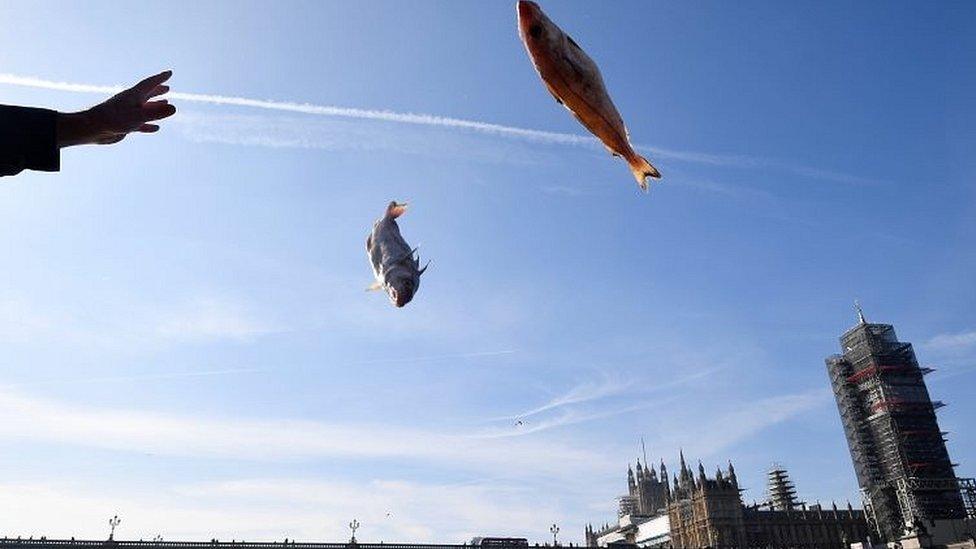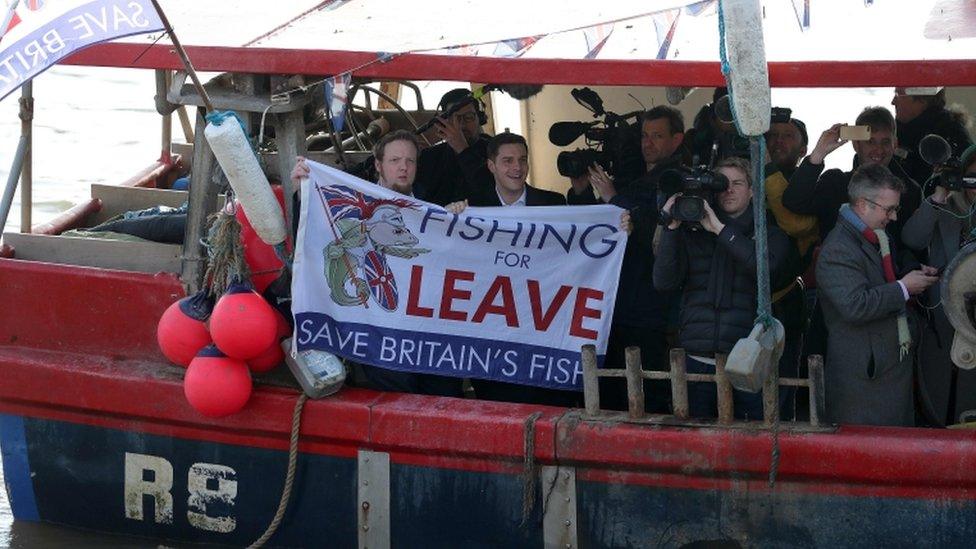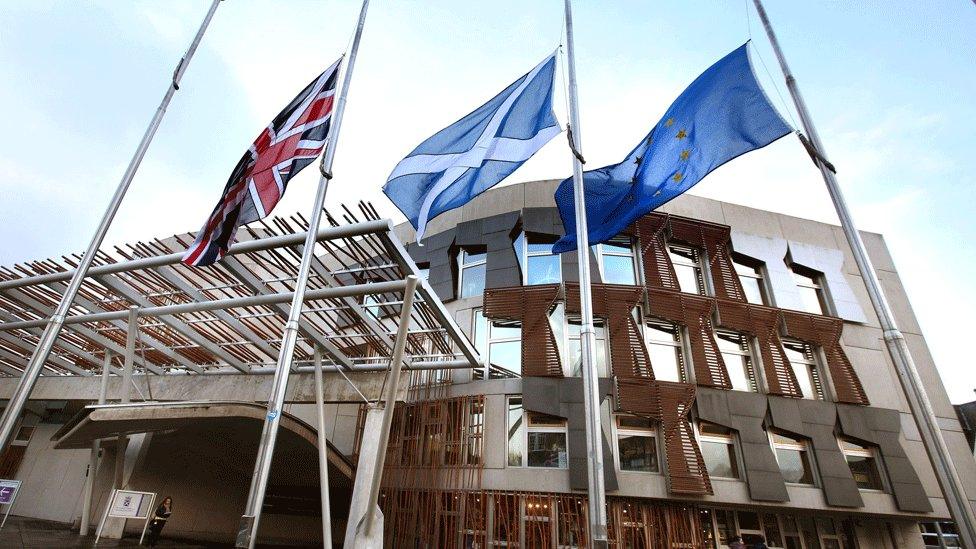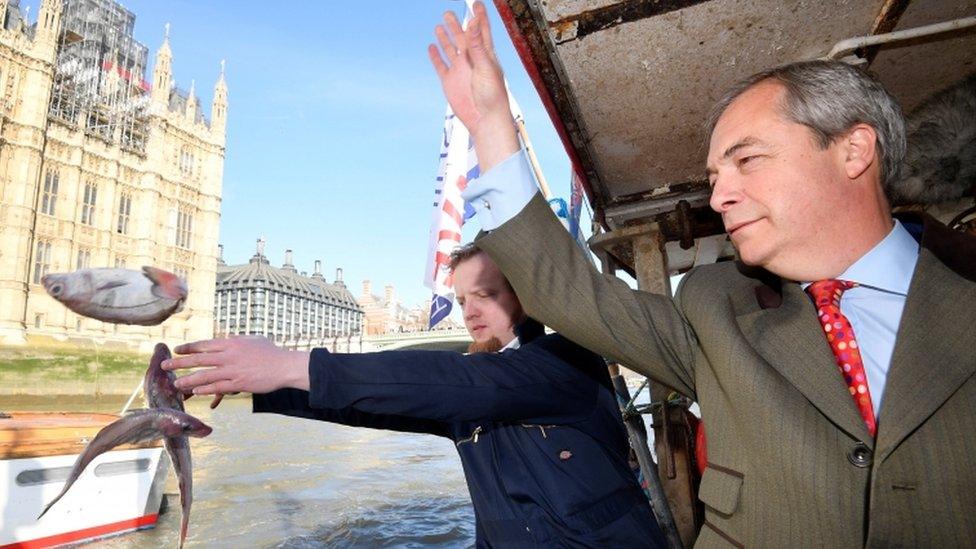A Brexit chess match at Holyrood and Westminster
- Published

The row over fishing powers saw some Brexiteers flinging fish in the Thames outside Westminster
It is quite some time, admittedly, since I subbed the fish prices in the Press and Journal. However, I well remember the meticulous precision which was required in ensuring that, for example, one did not confuse gutted haddock with round haddock.
Worse, muddle megrim with plaice, and piscine hell ensued. There is a comparable degree of detail rightly associated with the current controversy over fish in relation to Brexit.
The fishing industry had expected sovereignty over UK waters to be restored from the very moment of Brexit. Now they have been told that Common Fisheries Policy rules will extend for longer, into the transition period.
And, further, they scent a possible sell-out beyond that. They wonder whether the interests of the fishing fleet might, once again, be considered "expendable" by comparison with, for example, the financial sector or the car industry.
(Expendable? The term used in an internal memo from the 1970s, as Britain prepared to enter the then Common Market, when it was suggested that the fleet might rank rather lowly in UK concerns.)
But, alongside that detail, there is a brutally simple political conflict under way. Many folk, especially in the North-east of Scotland, were cajoled into voting Conservative by the promise of a good deal for fishing, post Brexit.
The accusation now is "betrayal". Privately, Tories know that. They fear that. Hence, the talk of insurrection at Westminster by backbench Tories. Hence the request by those same backbenchers for reassurance from the prime minister.

Aberdeen South MP Ross Thomson has been in the thick of the fishing protests
Is there any chance of regaining a degree of flexibility for the fishing industry within the transitional period? Bluntly, no.
UK ministers say they tried their best, they exerted their sinews in pursuit - not of the silver darlings, but of a suitable deal with their EU counterparts. No dice, we are told.
That boat has sailed. Relaunch is unrealistic, particularly given the complexity of the agreement itself. It will not be easily unpicked.
Complaints will, understandably, continue. Sundry folk will, justifiably, voice their anger. In practice, the focus now must be upon the longer, post-transition deal. That is as true for the industry - as it is for the various politicians who purport to represent their interests.
After those talks with the PM, one hears renewed optimism from Tory backbenchers in the Commons. In truth, they can do no other.
They have to hope and pray that the long-term deal is sufficiently satisfactory - or can be sold as such - that there is no need to carry on with rebellion.
Yes, they could threaten to vote down the ultimate Brexit bill. But they don't want to do that - especially those who are, ironically, ardent Brexiteers.
Further, what if bringing down the bill also brings down the prime minister, who has offered them such emollient words.
What was that? Who said: "Result!"? Take that person's name. Remember, these are loyal Conservatives. They fear that the replacement for Mrs May, if a general election were to result, might be Jeremy Corbyn. Plus they might lose their own seats in an early poll, with opinion still raw.

So they hope for a long-term deal. Meanwhile they resort, entirely understandably, to cat-calling their opponents. Taking their lead from Michael Gove, they say that a big prize still awaits the fishing industry, outwith the EU.
They say that the SNP, in particular, would revert to EU membership - and thus, presumably, membership of the CFP.
A valid attack which has caused the SNP some discomfiture although, of course, the immediate focus is upon Tory travails.
It helps explain the nuance one occasionally hears from senior SNP figures anent the EU. Yes, they would rejoin - but they would want to opt out of the CFP. Yes, they would rejoin - but they would have a place at the top table to negotiate a new fisheries deal.
Or even, from time to time, one hears that perhaps an independent Scotland might initially seek a Norway-style relationship with the EU, short of full membership. Thus side-stepping the hated CFP.
Tricky stuff, all round. Multi-layered. And at Holyrood this afternoon there has been another political chess match under way as MSPs consider the continuity bill at stage three.
You remember? The statute designed to transfer EU powers into Scots Law in the event that there is no agreement between the UK and Scottish powers on repatriation.
Legal challenges
This is an intriguing manoeuvre. Mike Russell, the minister for mitigating Brexit, has handled the issue deftly, as is his wont.
The bill, he insists, is a backstop. Would not be needed had the UK government played fairly with Scottish ministers.
And, further, he says it could still be abandoned, even after tonight's final parliamentary vote. Section 37 allows ministers to repeal said act, subject to the affirmative procedure in parliament.
In short, the act contains its own self-destruct mechanism, in the event that there is a subsequent ministerial deal.
One more thing. Law officers in both the Scottish and UK governments have 28 days after tonight to take the legislation to the Supreme Court, with an argument that it is unconstitutional.
You'll remember that the presiding officer has already advised that the continuity bill goes beyond Holyrood's existing powers. But that's it. He had his say - and MSPs decided to continue, despite Conservative protests.
The Lord Advocate has already said he is happy with the constitutional propriety of the bill. Which leaves the law officers in the UK Government.
Might they go straight to the Supreme Court to seek to have the Bill struck down? Or might they hold off for now, pending the prospect of an agreement between the Scottish and UK Governments?
Sicilian defence, anyone?
- Published21 March 2018
